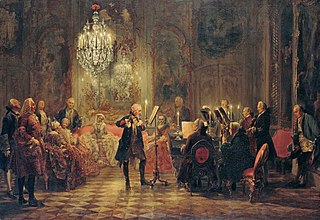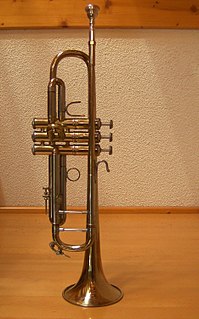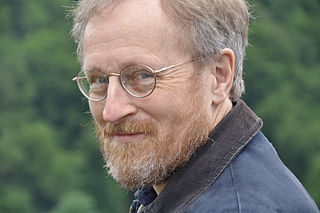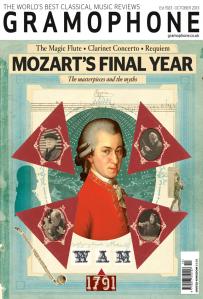
A concerto is a musical composition generally composed of three movements, in which, usually, one solo instrument is accompanied by an orchestra or concert band. It is accepted that its characteristics and definition have changed over time. In the 17th century, sacred works for voices and orchestra were typically called concertos, as reflected by J. S. Bach's usage of the title "concerto" for many of the works that we know as cantatas.
Flute repertoire is the general term for pieces composed for flute. The following lists are not intended to be complete, but rather to present a representative sampling of the most commonly played and well-known works in the genre. The lists also do not generally include works originally written for other instruments and subsequently transcribed, adapted, or arranged for flute, unless such piece is very common in the repertory, in which case it is listed with its original instrumentation noted.
Peter Scott Lewis is an American composer of contemporary classical music.

Vache Sharafyan, One of the major composers in Armenia, but also internationally Vache Sharafyan is the author of more than ninety compositions including symphonic works, chamber music, choral, vocal music, including the opera "King Abgar", one act ballet "Second Moon", ballet in acts "Ancient Gods".

The trumpet repertoire consists of solo literature and orchestral or, more commonly, band parts written for the trumpet. Tracings its origins to 1500 BC, the trumpet is a musical instrument with the highest register in the brass family.
Jennifer Higdon's Concerto for Violin and Orchestra was written in 2008. The work was jointly commissioned by the Indianapolis Symphony Orchestra, the Toronto Symphony Orchestra, the Baltimore Symphony Orchestra, and the Curtis Institute of Music. It was composed for the violinist Hilary Hahn and was given its world premiere by Hahn and the Indianapolis Symphony Orchestra under the conductor Mario Venzano on February 6, 2009. The piece was later awarded the 2010 Pulitzer Prize for Music.
Scott Slapin is an American composer and violist based in South Hadley, Massachusetts.

Peter Seabourne is a contemporary classical composer based in Lincolnshire, United Kingdom.
The Concerto for Orchestra is an orchestral composition in five movements by the American composer Jennifer Higdon. The work was commissioned by the Philadelphia Orchestra with contributions from the National Endowment for the Arts, the Philadelphia Music Project, and Peter Benoliel. It was premiered at the Kimmel Center for the Performing Arts in Philadelphia June 12, 2002, with conductor Wolfgang Sawallisch leading the Philadelphia Orchestra.
The Viola Concerto is a concerto for viola and orchestra in three movements by the American composer Jennifer Higdon. The work was jointly commissioned by the Library of Congress, the Nashville Symphony, the Curtis Institute of Music, and the Aspen Music Festival. It was premiered March 7, 2015 at the Thomas Jefferson Building in Washington, D.C., with conductor Robert Spano leading violist Roberto Díaz and the Curtis Chamber Orchestra. The work won the 2018 Grammy Award for Best Classical Contemporary Composition.
The Piano Concerto is a concerto for solo piano and orchestra by the American composer Jennifer Higdon. It was commissioned by the National Symphony Orchestra and was first performed December 3, 2009 at the John F. Kennedy Center for the Performing Arts in Washington, D.C.. The premiere featured pianist Yuja Wang and the National Symphony Orchestra under conductor Andrew Litton.
Concerto 4-3 is a concerto for two violins, double bass, and orchestra in three movements by the American composer Jennifer Higdon. The work was commissioned for the string trio Time for Three by the Philadelphia Orchestra, the Pittsburgh Symphony Orchestra, and the Wheeling Symphony Orchestra. It was first performed in Philadelphia on January 10, 2008, by Time for Three and the Philadelphia Orchestra conducted by Christoph Eschenbach.
Loco is an orchestral composition in one movement by the American composer Jennifer Higdon. The work was commissioned by the Ravinia Festival of Highland Park, Illinois to commemorate the Ravinia train as part of the Train Commission Project. It was first performed on July 31, 2004 at the Ravinia Festival by the Chicago Symphony Orchestra.
The Singing Rooms is a concerto for solo violin, choir, and orchestra by the American composer Jennifer Higdon. The work was jointly commissioned by the Philadelphia Orchestra, the Atlanta Symphony Orchestra, and the Minnesota Orchestra. It was first performed on January 17, 2008 in Philadelphia by the violinist Jennifer Koh, The Philadelphia Singers, and the Philadelphia Orchestra under the conductor Christoph Eschenbach. The text of the piece is set to poems by Jeanne Minahan.
The Oboe Concerto is a concerto for a solo oboe and orchestra by the American composer Jennifer Higdon. The work was commissioned by the Minnesota Commissioning Club and was premiered on September 9, 2005 by the oboist Kathy Greenbank and the Saint Paul Chamber Orchestra. Higdon later reworked the piece into her Soprano Sax Concerto in 2007.
The Soprano Sax Concerto is a concerto for soprano saxophone and orchestra by the American composer Jennifer Higdon. The work was originally commissioned by the Minnesota Commissioning Club as Higdon's Oboe Concerto and was premiered by oboist Kathy Greenbank and the Saint Paul Chamber Orchestra in 2005. Higdon later reworked the composition, however, and the piece was premiered in its form as a saxophone concerto on August 3, 2007 at the Cabrillo Festival of Contemporary Music by the saxophonist Timothy McAllister and the Cabrillo Festival Orchestra under the conductor Marin Alsop.
The Concerto for Viola and Orchetra is a musical composition for viola and orchestra by the American composer Walter Piston. The work was written in 1957 for the violist Joseph de Pasquale, who first performed the piece with the Boston Symphony Orchestra on March 7, 1958.









